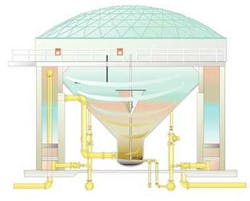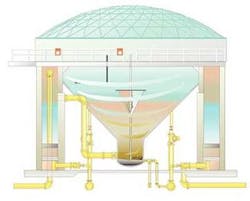Major Drinking Water Systems Pursue Common Goals Through AMWA
Testifying this spring before an oversight subcommittee in the U.S. House of Representatives, Association of Metropolitan Water Agencies (AMWA) President John P. Sullivan, Jr., told lawmakers that the proposed Department of Homeland Security "will better protect consumers from bioterrorism and life-threatening disruption of water services." Sullivan, who is the Chief Engineer of the Boston Water and Sewer Commission, spoke on AMWA's behalf to communicate the views of the nation's largest publicly owned drinking water agencies.
This Capitol Hill appearance, on an issue of pressing concern to water systems and their customers, is typical of the work of AMWA, whose member agencies collectively serve the drinking water needs of more than 110 million people across the country.
Water systems throughout the country share a host of common concerns and challenges. On many key issues, however, the interests of water agencies of differing size, locale or ownership diverge. More than two decades ago, it become evident to executives of some of the nation's largest public water utilities that the problems that confront them are not always the same as those of small or rural systems. So in 1981, the Association of Metropolitan Water Agencies (AMWA) was formed by major water system managers to ensure that the issues of large publicly owned water suppliers would be represented in Washington, D.C.
While water issues change and develop over time, the association's primary mission remains the same — to work with Congress and federal agencies to ensure safe and cost-effective federal drinking water laws and regulations. In addition, AMWA members are committed to improved, competitive public water supply operations through collection and exchange of management, scientific and technical information.
Water executives that participate in the association believe that publicly owned drinking water systems must be effective, efficient and competitive. They support promulgation of standards based upon sound health effects data, risk assessment, generally available technology and cost considerations. And, they advocate environmental priorities based on a scientific approach to policy making, renewed emphasis on pollution prevention and development of ground water and surface water protection initiatives.
Legislative, Regulatory Issues
AMWA member agencies are represented in the organization by their general managers and CEOs, and these senior executives provide the vision and experience to develop the association's legislative and regulatory positions. As an association of top utility executives, AMWA can move quickly when strategic decisions are needed, can speak with authority on the full range of drinking water issues and can offer members access to others who share their level of experience and responsibility.
The association is currently working with other national water and municipal groups on legislative concerns such as water infrastructure funding and on security considerations including vulnerability assessments and the protection of sensitive utility information. The group has also been active in recent efforts to increase federal funding for farm conservation to protect drinking water sources.
AMWA was a leader in Congressional reauthorization of the Safe Drinking Water Act Amendments of 1996, legislation that fundamentally changed the way EPA develops rules. Each year it lobbies Congress on funding for drinking water programs, watershed protection, and other important programs. The association advocates for public finance legislation, nonpoint source pollution control, an updated Endangered Species Act, and protection of the nation's ground water supplies.
A charter member of the Water Infrastructure Network (WIN), AMWA's leadership in this influential coalition supports development of solutions to meet the staggering infrastructure needs of the nation's drinking water and wastewater systems.
AMWA maintains close working relationships with EPA officials, other federal policy makers and national environmental organizations. Hallmarks of AMWA's regulatory endeavors are its strong credibility with federal regulators and its reputation for expert analysis. These help ensure that the association has an impact on federal drinking water regulations. In response to the association's primary focus on Safe Drinking Water Act issues, AMWA members and staff have participated in hundreds of meetings and work sessions with the EPA on the development of dozens of new rules and drinking water standards.
Water Security
Water system security is an equally important mission for the association. Long before critical infrastructure and water safety came into the national security spotlight following the September 11 attacks, the water sector was designated a critical infrastructure in the U.S. under a 1998 presidential directive. Since that time, AMWA has served as the water sector's liaison to the federal government on physical and cyber threats. The association provided leadership in this area by forming an advisory group to coordinate water industry activities and working actively for federal funding of vulnerability assessments, emergency planning and research on a range of security issues.
Under a grant from EPA, AMWA is developing the Water Information Sharing and Analysis Center (Water ISAC) to gather, analyze and disseminate information on threats, attacks and vulnerabilities. Scheduled to begin operations by year's end, the Water ISAC is designed to facilitate communication among drinking water and wastewater utilities and counter-terrorism and law enforcement experts. It will rely on information gathered from utilities' security incident reports, federal law enforcement agencies, intelligence agencies and other sources and will provide:
• Intelligence on physical and cyber threats;
• Expert analysis of incidents and trends;
• A connection to federal agencies;
• Research and white papers;
• Information on contaminants;
• Resources for emergency planning;
• Measures to improve security; and,
• A secure Internet forum for sharing information.
Efficiency, Competition
Today's water utility managers operate in an increasingly competitive environment, and this fall AMWA recognized the accomplishments of the best-managed water systems through its third annual Gold Awards for Competitiveness Achievement. Benchmarking, competitiveness strategy and competitiveness improvement initiatives are among the factors assessed in the awards process. The awards reflect the effects of competitive endeavors on factors such as new technology introduction, infrastructure management, bond rating and financial situation, and customer satisfaction.
AMWA also provides its members with the resources they need to meet the ever-expanding demands and expectations of customers and local government officials. The association sponsors a series of customized competitiveness workshops and develops tools to help members maintain efficiency and effectiveness in a rapidly changing industry. Members have access to the ideas of industry experts and the experience of leading water agency managers on best practices for competing in today's challenging environment. The association is also a partner in the Water and Wastewater Leadership Center at the University of North Carolina – Chapel Hill.
Information on Water Issues
Timely and accurate industry intelligence is essential for successful water system management, and AMWA puts critical drinking water information in the hands of its members on a real-time basis. Through its web site, e-mail and faxes, as well as more traditional publications, AMWA covers the legislative, regulatory, security and privatization news that keeps its members on top of developments that impact their agencies and their operations.
When members are confronted with national media attention, AMWA produces sample news releases, talking points, and briefing papers to help them respond to questions from the press. Solid relationships with trade press and national news organizations make AMWA a trusted source for comment and background on drinking water issues, producing positive media exposure that helps promote water suppliers' goals.
In addition, AMWA convenes national meetings several times a year to bring together the industry's senior executives in forums to share ideas, to build relationships and to interact with federal regulatory and legislative decision makers.



